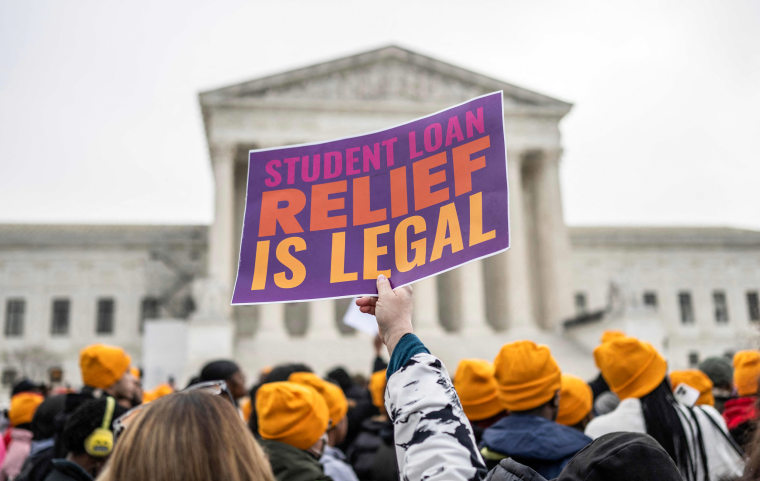WASHINGTON — House Republicans introduced a plan to address student debt Thursday afternoon as the Supreme Court is set to rule in the coming weeks on whether President Joe Biden’s federal student loan forgiveness program can remain in effect.
The Federal Assistance to Initiate Repayment Act, led by Republicans on the House Education and Workforce Committee, would provide “targeted” student loan relief for borrowers who “already paid back more than they originally owed taxpayers in principal and interest," streamline several existing income-driven repayment plans into one system and give borrowers in default another chance to rehabilitate their loans.
“This Republican solution takes important steps to fix the broken student loan system, provide borrowers with clear guidance on repayment, and protect taxpayers from the economic fallout caused by the administration’s radical free college agenda,” Reps. Burgess Owens, R-Utah; Lisa McClain, R-Mich.; and Virginia Foxx, R-N.C., who chairs the committee, said in a statement.
The trio, who are the lead sponsors of the legislation, also criticized Biden's approach. “With extension after extension, the Biden administration turned a short-term payment pause on student loans during the height of the pandemic into a three-year-long pause that cost American taxpayers billions to prop up,” they said.
Federal student loan payments are set to resume at the end of August under an agreement in the debt ceiling law Biden signed this month. Payments have been paused since March 2020, when President Donald Trump signed the CARES Act into law; he and Biden both extended the pause.
Owens, McClain and Foxx said the extensions “left schools, servicers, and students uncertain about the future,” adding that borrowers need guidance. The new legislation would require the Education Department to notify student loan borrowers at least 12 times before repayments resume.
The bill would also end "time-based" student loan repayment, which allows borrowers to make the same recurring payments over time.
Meanwhile, a group of Senate Republicans led by Bill Cassidy of Louisiana introduced their own student debt-focused legislation Wednesday. The plan, separate from the House bill, is a package of five bills that would increase transparency around the cost of college and students loans, streamline repayment plan options and put "downward pressure on rising tuition costs by limiting graduate school borrowing," Cassidy said.
“And unlike President Biden’s plan, this actually addresses the root causes of the student debt crisis," he said.
Congress tried to stop Biden’s plan to provide up to $20,000 in student debt relief for certain borrowers, but Biden vetoed the measure last week.
The Republican-led effort passed the House in May largely along party lines. The Senate approved the bill this month with a handful of moderate Democrats joining Republicans in support.
"I won’t back down on helping hardworking folks. That’s why I’m vetoing this bill,” Biden tweeted at the time.

